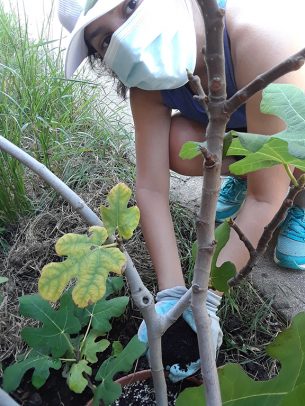Closing the loop on UIC’s food waste

By Anh Le
Student communication aide at the UIC Chicago’s Office of Planning, Sustainability, and Project Management
For the first time, the University of Illinois Chicago (UIC) has received compost from Collective Resource Inc. through the organization’s compost gift-back event. The compost will be used as natural fertilizer for the Heritage Garden. This process is what the Office of Planning, Sustainability, and Project Management (PSPM) calls “closing the loop.”
Through the Zero Waste Campus Climate Commitment, the university is committed to operating an efficient campus that is continually working toward eliminating 90% of waste sent to landfills. To achieve this commitment, a food scrap compost program was established at UIC’s Student Center East (SCE) dining facility.
In 2012, it was reported that the Student Center East’s dining hall served, on average, 3,000 meals a day, which produced a substantial amount of food waste. The university partnered with the dining halls in the student centers to collect food scraps for compost in an effort to increase the university’s recycling rate and simultaneously decrease food waste.
“We estimated there could be as much as 850 tons a year of food scraps across all of UIC,” said Joe Iosbaker, recycling coordinator at PSPM, “Capturing all of that would increase our campus recycling rate to almost 70%.”
Collective Resource Inc. (CRI) is a woman-owned compost and food scrap pickup service based in Evanston. The business mitigates climate change by recovering organic resources through commercial composting and zero waste education and creating community around sustainability. As a vendor to UIC, CRI also helps manage zero waste events on campus, providing training and volunteer supervision, delivering, and setting up totes and hauling the collected food scraps away.
Since September 2018, CRI has collected 129 tons of food scraps from UIC, averaging 4.6 tons a month. In 2019, the university expanded to the largest kitchen on campus at the University of Illinois Hospital. Currently, the program has extended to the kitchen at the Isadore & Sadie Dorin Forum. From January to December 2020, the collection was 35.4 tons, for an average of 2.95 tons per month.
Nadia Sol Ireri Unzueta Carrasco, the Heritage Garden educator, said that the Heritage Garden will fertilize areas with the compost with heavier feeders and deep cultural ties, such as cucumbers, eggplants, peppers and okra.
The UIC Heritage Garden is a hands-on learning project with an internship program. The program manages 8 satellite gardens on the east side of campus. Student interns in the program work with faculty, staff and community members to connect horticulture with environmental sustainability, cultural diversity and social justice.
Unzueta Carrasco believes that adding the compost to the gardens will introduce nutrients and organic matter to the soil, which benefit the plants and the ecosystem. The gardens are fertilized annually at the beginning of the growing season.
Besides the composting program, the university is also tackling excessive food production to reduce food waste. UIC Dining Services has implemented methods to prevent the excess preparation of food, and the UI Hospital kitchen is implementing a program to reduce wasted food.
The food compost program at UIC is a part of the recycling program at PSPM, and it is funded by the Student Centers, UI Hospital, and the Vice Chancellor for Student Affairs.
Categories
